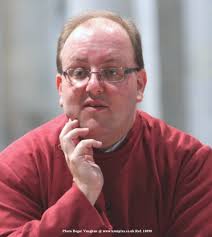Rochester Cathedral, 7 June 2014
Scott Farrell took over as Director of Music at Rochester Cathedral in 2008 but this was his first time as conductor of the Rochester Choral Society. Added to this, the choice of work had already been decided by his predecessor. No pressure then!
In the event this was a highly successful evening with much glorious music making from all involved. While the solo parts are important, the weight of the evening rests securely with the choir, and most of the first half relies on their stamina and accuracy to ensure we move swiftly and securely through the list of plagues and calamities before emerging into the light of the desert. The opening chorus And the children of Israel cried was taken at a fast pace, a hint of what was to come throughout the evening, pushing the narrative forward and maintaining the momentum throughout. Given that the ranks of men, as so often with local choirs, were heavily outnumbered by the ladies, they were remarkably forceful. In Israel Handel frequently opens a chorus with the men, which puts pressure on them not only for accuracy and attack but for impact. This is particularly difficult in the double choruses but they carried the line with aplomb.
The sopranos proved to be clear and precise, with strongly held top lines. He smote all the first-born of Egypt and Thou sentest forth Thy wrath were noteworthy for their sensitivity.
The solo parts were unusually distributed. Clifford Lister revelled in the dramatic opportunities that the tenor part gives him and The enemy said was sung with fire and a final ornamental flourish which thrilled the audience. Counter-tenor Toby Foster was most at ease in the mellifluous Thou shalt bring them in and treble Raphael Janssens was an inspired choice for Thou didst blow.
There is not a lot for soprano in a very male-dominated work but Rachael Cox saved the best for last with her exultant cry from Miriam and leading a final chorus of bombastic enthusiasm which only Handel can inspire.
The Rochester Sinfonietta provided firm accompaniment, though the addition of two trombones to a Handelian band was a little startling. The continuo parts from Claire Innes-Hopkins, organ, and Adrian Bawtree, harpsichord, were apt and sensitive.
Scott Farrell has made a very distinctive impact in a difficult work. We can look forward to many more fine evenings – the next of which is on Saturday 8 November at St George’s Centre, Chatham Maritime, when we will hear Brahms’ German Requiem.

